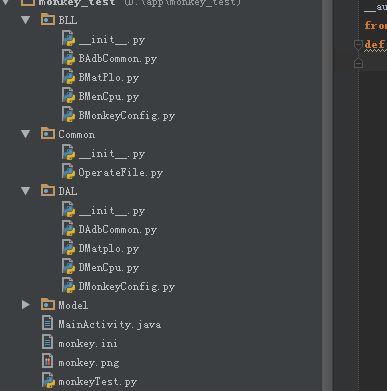基于 (python-monkey 压测监控 app)[https://testerhome.com/topics/5662]
最开始是看到了蛇的文章来学习的 https://testerhome.com/topics/2514 找了好久才找到。。。
- 最近开始关注代码的分离质量了,就开始学习了三层架构,重构之前的 monkey 测试代码

- MODEL 实体类
- DAL 数据处理,用的最多的就是数据库方法
- BLL 业务逻辑 这里个人一直不是很理解
- COMMON 放一些公用的方法在里面
代码分析
model 层
用的 schematics,不用自己写 get,set 了
from schematics.models import Model
from schematics.types import StringType,IntType
class monkeyconfig(Model):
cmd = StringType()
package_name = StringType()
logdir = StringType() #本机的log存放地址
remote_path = StringType() #远程服务器地址,可以给开发查看
phone_msg_log = StringType() #临时存放手机日志信息路径
now = StringType()
exceptions = StringType() #异常列表监控
sum = StringType() #事件数量
activity = StringType()
monkey_log = StringType()
- 如果我的实体类想放 list 怎么弄?
- ListType(IntType) 这样就可以了,是不是很酷
- 设置值就这样设置 [[111],[3333]]
DAL 层
import configparser
import time
def monkeyConfig(mmonkeyconfig, init_file):
config = configparser.ConfigParser()
config.read(init_file)
mmonkeyconfig.package_name = config['DEFAULT']['package_name']
mmonkeyconfig.logdir = config['DEFAULT']['logdir']
mmonkeyconfig.remote_path = config['DEFAULT']['remote_path']
mmonkeyconfig.phone_msg_log = config['DEFAULT']['phone_msg_log']
mmonkeyconfig.now = time.strftime('%Y-%m-%d-%H_%M_%S', time.localtime(time.time()))
mmonkeyconfig.activity = config['DEFAULT']['activity']
mmonkeyconfig.sum = int(config['DEFAULT']['sum'])
mmonkeyconfig.monkey_log = mmonkeyconfig.logdir + "\\" + mmonkeyconfig.now + r"monkey.log"
mmonkeyconfig.cmd = config['DEFAULT']['cmd'] + " " + str(mmonkeyconfig.sum) + ">>" + mmonkeyconfig.monkey_log
return mmonkeyconfig
BLL 层
from DAL import DMonkeyConfig
def monkeyConfig(mmonkeyconfig, init_file):
return DMonkeyConfig.monkeyConfig(mmonkeyconfig, init_file)
UI 层
# 只调用BLL层的东西
from BLL import BMatPlo
from BLL import BAdbCommon
from Common import OperateFile
from BLL import BMonkeyConfig
from Model import MMonkeyConfig
from Model import MMatplo
from BLL import BMenCpu
ba = BAdbCommon
mconfig = MMonkeyConfig.monkeyconfig()
mc = BMonkeyConfig.monkeyConfig(mconfig, ini_file)
# 下面就可以取实体类的值
mc.cmd, mc.logdir, mc.now, mc.monkey_log
入口代码
import os
import time
import datetime as dt
from BLL import BMatPlo
from BLL import BAdbCommon
from Common import OperateFile
from BLL import BMonkeyConfig
from Model import MMonkeyConfig
from Model import MMatplo
from BLL import BMenCpu
#开始脚本测试
def start_monkey(cmd, logdir, now1, monkey_log):
print(cmd)
os.popen(cmd)
cmd2 = "adb logcat -d >%s" % monkey_log
os.popen(cmd2)
# logcatname=logdir+"\\"+now1+r"logcat.log"
# cmd2="adb logcat -d >%s" %(logcatname)
# os.popen(cmd2) 用于error的分析
#print"导出traces文件"
tracesname = logdir + "\\" + now1 + r"traces.log"
cmd3 = "adb shell cat /data/anr/traces.txt>%s" % tracesname
os.popen(cmd3)
if __name__ == '__main__':
ini_file = 'monkey.ini'
ba = BAdbCommon
if OperateFile.base_file(ini_file, "r").check_file():
if ba.attached_devices():
mconfig = MMonkeyConfig.monkeyconfig()
mc = BMonkeyConfig.monkeyConfig(mconfig, ini_file)
# 打开想要的activity
ba.open_app(mc.package_name, mc.activity)
temp = ""
# monkey开始测试
start_monkey(mc.cmd, mc.logdir, mc.now, mc.monkey_log)
# cpu,men统计
ml = MMatplo.matplo()
bm = BMenCpu.get_men_cpu(mc.package_name)
ml.cpu = [[], []]
ml.men = [[], []]
ml.title = ["cpu测试", "内存测试"]
ml.locator = 2
for i in range(mc.sum):
time.sleep(1)
dn = dt.datetime.now()
ml.cpu[0].append(dn)
cpu = bm.top_cpu()
ml.men[0].append(dn)
men = bm.get_men()
with open(mc.monkey_log, encoding='utf-8') as monkeylog:
temp = monkeylog.read()
if temp.count('Monkey finished') > 0:
print("测试完成咯")
ml.cpu[1].append(cpu)
ml.men[1].append(men)
BMatPlo.cpu_men_plots(ml)
break
else:
print("设备不存在")
else:
print(u"配置文件不存在"+ini_file)
如果觉得我的文章对您有用,请随意打赏。您的支持将鼓励我继续创作!